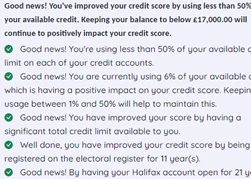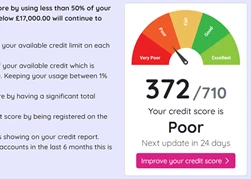Why You Might Be Rejected For a Mortgage

7th Feb 2025
Getting rejected for a mortgage can feel discouraging, but don’t rush to apply elsewhere right away. Multiple rejections can hurt your credit score. Instead, take a moment to understand why your application was declined and focus on improving your chances for the next one.
Most Common Reasons You Might Be Turned Down
Lenders evaluate several factors before deciding whether to approve your mortgage application. There are lots of factors which might go against you depending on your circumstances. Sometimes these are obvious, but other factors are less well known and can catch people out if they are unfamiliar with the criteria used to decide who to lend money to. These factors can include:
- Not Being Registered to Vote
You must be registered on the electoral roll to help lenders confirm your identity and address. Not being registered to vote is a serious black mark against you and is one of the easiest things to fix. - Poor Credit History
Lenders may see a history of missed or defaulted payments, County Court Judgments (CCJs), or recent credit applications as signs that you could be a high-risk borrower. Check your credit report to verify whether there is anything on your record which might affect an application. - Affordability Issues
Lenders are legally required to work out whether you can actually afford mortgage repayments. If they think that the loan you are proposing is overstretching yourself, this could also lead to rejection. - A Small Deposit
If your deposit isn’t large enough, you may need to borrow more than a lender is willing to lend, making them hesitant to approve your application. Your options here are to save up more money to offer a larger deposit or look for a cheaper property so that you don’t need to borrow as much money.
Tips for Improving Your Mortgage Position
There are a few things you can do to make the mortgage application process more straightforward and increase your chances of acceptance. The first is to consider using a mortgager broker, who can help you target your applications towards lenders who are more likely to accept you. They will also usually be able to give more general financial advice about improving your credit scores.
Saving a larger deposit is the other option, although perhaps not always easy. Many first time buyers choose to move back in with parents, or live in cheap shared accommodation to enable them to save as much as possible. A guarantor is another option, and this means asking a close relative or friend to guarantee the payments. The downside to that is that if you fail to make your mortgage payments, they must make them for you.
Even if you are not ready to apply for a mortgage, get into the habit of checking your credit report regularly. If you’re familiar with the various websites and apps and know how changes you make affect your score, you are best placed to keep your finances healthy and maximise your choice of mortgage products when you find your dream home.
Don't risk missing
something important
Access a comprehensive credit report
that includes detailed data from TransUnion
View your credit score for only £1.95.
You can view it for 1 month, after which it will be £14.95 per month unless cancelled.
See How You Score

See How You Score
An Independent View Of Your Credit Score
Lenders typically use their own systems to calculate your Credit Score based on the information in your Credit Report, often checking with one or more Credit Reference Agencies. Your Credit Check Online Credit Score is derived from all the Credit Report information we gather from TransUnion, helping you understand how you might be assessed when applying for credit.

Understand What is Affecting Your Credit Score
Quickly see how the details in your Credit Report influence your Credit Check Online Credit Score, both positively and negatively. This clear overview helps you identify areas for improvement and better understand the factors that lenders consider when assessing your creditworthiness.
View your credit score for only £1.95.
You can view it for 1 month, after which it will be £14.95 per month unless cancelled.